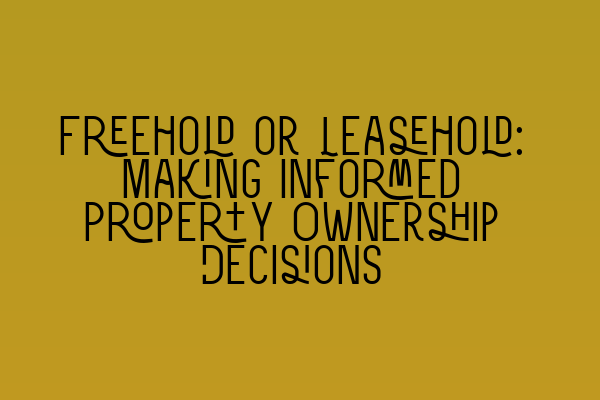Freehold or Leasehold: Making Informed Property Ownership Decisions
When it comes to purchasing property, one of the most important decisions you’ll face is whether to opt for a freehold or leasehold ownership. Understanding the difference between these two types of ownership is crucial as it can have significant implications for your investment and future plans. In this blog post, we will explore the key features of freehold and leasehold properties, helping you make an informed decision that suits your needs and preferences.
What is Freehold?
A freehold property provides the owner with full and absolute ownership of both the land and the property standing on it. The owner has no lease or time restrictions, and can use and enjoy the property as they see fit. Freehold is often perceived as the ideal form of property ownership, offering a sense of security and independence.
Benefits of Freehold:
1. No Ground Rent: Unlike leasehold properties, freehold properties are not subject to ground rent which can be a recurring expense over time. With a freehold property, you have complete control over your finances without worrying about additional costs.
2. No Lease Length Worries: Leasehold properties come with lease terms that can eventually expire, potentially leaving you in a vulnerable position. With freehold ownership, you don’t have to deal with lease extensions or renewals. You are in control of your property for as long as you wish.
3. Greater Flexibility: Freehold property owners have more autonomy in making changes or modifications to their property. Whether you want to renovate, extend, or modify the property, there are generally fewer restrictions since you are the sole owner.
What is Leasehold?
Leasehold ownership, on the other hand, provides the owner with temporary rights to occupy and use the property. Leasehold properties are typically owned for a fixed number of years, as specified in the lease. At the end of the lease term, ownership typically reverts to the freeholder unless a lease extension is agreed upon.
Benefits of Leasehold:
1. Lower Purchase Price: Leasehold properties often come with a lower upfront purchase price compared to freehold properties. This can be beneficial if you have a limited budget or want to invest in a property without committing to full ownership.
2. Maintenance Responsibilities: In a leasehold property, the responsibility for maintenance and repairs may lie with the freeholder or property management company. This allows you to free up time and avoid potential stress associated with property upkeep.
3. Shared Facilities: Leasehold properties, particularly those in apartment buildings or managed estates, often benefit from shared facilities such as gardens, parking areas, or communal spaces. These shared amenities can enhance your living experience without the burden of individual maintenance.
Making an Informed Decision
To make the best decision for your circumstances, it’s essential to consider various factors:
1. Future Plans: Assess your long-term plans and goals. If you envision staying in the property for an extended period or want complete control, freehold ownership may be the most suitable option. However, if you’re looking for a temporary residence or prefer a more hands-off approach to maintenance, leasehold could be a viable choice.
2. Financial Considerations: Evaluate your budget and financial capabilities. Freehold properties may have a higher upfront cost, but they do not involve recurring ground rent payments. Leasehold properties, while potentially more affordable at first, may incur additional costs over the lease term.
3. Consult with Professionals: Seek expert advice from qualified solicitors who specialize in property law. They can guide you through the intricacies of the different types of ownership and help you understand the legal implications before making a final decision.
In conclusion, the choice between freehold or leasehold ownership is a crucial one. By weighing the benefits and considering your current circumstances and future plans, you can make a well-informed decision that aligns with your needs and preferences. Remember to seek professional advice to ensure a smooth property purchasing process.
